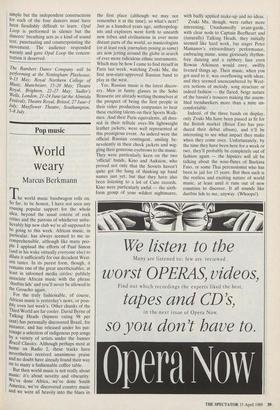Pop music
World weary
Marcus Berkmann
The world music bandwagon rolls on. So far, to be honest, I have not seen any rousing popular support for the whole idea, beyond the usual coterie of rock critics and the patrons of whichever unbe- lievably hip new club we're all supposed to be going to this week. African music, in particular, has always seemed to me in- comprehensible, although like many peo- ple I applaud the efforts of Paul Simon (and in his wake virtually everyone else) to dilute it sufficiently for our decadent West- ern tastes. In its purest form, though, it remains one of the great uncriticisables, at least in informed media circles: publicly associate African music with the phrase 'dustbin lids' and you'll never be allowed in the Groucho again.
For the truly fashionable, of course. African music is yesterday's news, or poss- ibly even last week's. Other chunks of the Third World are far cooler. David Byrne of Talking Heads (hipness rating 98 per cent) has personally discovered Brazil, for instance, and has released under his pat- ronage a selection of indigenous pop songs by a variety of artists under the banner Brazil Classics. Although perhaps most at home on Radio 2, these tracks have nevertheless received unanimous praise and no doubt have already found their way on to many a fashionable coffee table.
But then world music is not really about music: it's about novelty and obscurity. We've done Africa, we've done South America, we've discovered country music and we were all heavily into the blues in the first place (although we may not remember it at the time), so what's next? Just as a hundred years ago, anthropolog- ists and explorers went forth to unearth new tribes and civilisations in ever more distant parts of the world, so musicologists (or at least rock journalists posing as same) are now jetting around the globe in search of ever more ridiculous ethnic instruments. Which may be how I came to find myself in Paris last week, watching Zvuki Mu, the first non-state-approved Russian band to play in the west.
Yes, Russian music is the latest discov- ery. Men in funny glasses in the Soho Brasserie are already wetting themselves at the prospect of being the first people in their video production companies to hear these exciting talents on their Sports Walk- men. And their Paris equivalents, all dres- sed in their telltale over-30s lightweight leather jackets, were well represented at this prestigious event. As indeed were the official Russian contingent, smiling be- nevolently in their check jackets and wig- gling their generous eyebrows to the music. They were particularly keen on the two 'official' bands, Kino and Auksion, who proved not only that the Soviets haven't quite got the hang of thinking up band names just yet, but that they have also been listening to a lot of Cure records. Kino were particularly awful — the sixth- form group of your wildest nightmares, with badly applied make-up and no ideas.
Zvuki Mu, though, were rather more interesting, Unashamedly avant-garde, with clear nods to Captain Beefheart and (naturally) Talking Heads, they initially seemed like hard work, but singer Peter Mamanov's extraordinary performance, embracing mime, some gloriously rhythm- free dancing and a rubbery face even Rowan Atkinson would envy, swiftly livened things up. Their music, when you got used to it, was overflowing with ideas, and they seemed unencumbered by West- ern notions of melody, song structure or indeed fashion — the flared, beige nature of the bassist's trousers making the assem- bled trendseekers more than a mite un- comfortable.
Indeed, of the three bands on display, only Zvuki Mu have been passed as fit for the British market (Brian Eno has pro- duced their debut album), and it'll be interesting to see what impact they make when they come over. Unfortunately, by the time they have been here for a week or two, they'll probably be completely out of fashion again — the hipsters will all be talking about the nose-flutes of Burkina Faso, or some Thai percussionist who has been in jail for 15 years. But then such is the restless and exciting nature of world music, at least until it runs out of new countries to discover. It all sounds like dustbin lids to me, anyway. (Whoops!)


















































 Previous page
Previous page